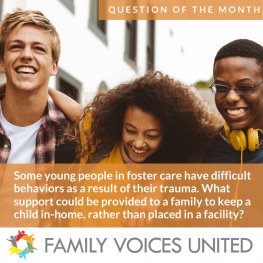
In your state, tribe, or jurisdiction, you can apply the expertise from those with lived experience outlined in this paper to develop prevention services and support programs that better address mental and behavioral health challenges, promote child and family well-being and prevent unnecessary entry into the child welfare system.
FIVE KEY THEMES emerged from the young people, parents and kinship caregivers who answered this question:
1. Invest in our mental health and well-being by ensuring we have access to trauma-informed therapy and mental health services.
2. We need support groups for youth, parents, and kinship caregivers.
3. Communicate with us. Honest and transparent conversations help us feel safe while connecting us to resources that meet and support our everyday and basic needs.
4. Invest in our normalcy, access to activities that promote positive youth development, family engagement and connections to community.
5. Focus on intensifying in-home services and supports based on our families’ specific needs, as opposed to rushing to remove us from our families.
How to use this paper:
The Family First Act can allow states to reimagine child welfare systems - including understanding and implementing trauma-informed preventive and treatment services. In this paper, you will hear from kinship caregivers, birth parents, current and former foster youth as they discuss the types of support services and resources that will help families who are facing mental, behavioral health, and/or addiction challenges receive support, build on their strengths and stay out of the foster care system, wherever possible. You can apply the expertise from those with lived experience outlined in this paper to develop prevention services and support programs that better address mental and behavioral health challenges, promote child and family well-being, and prevent unnecessary entry into the child welfare system. If you are interested in using the quotes or perspective contained in this document or if you would like to bring young people, parents, and relative caregivers to your event or project, email the Family Voices United team at info@familyvoicesunited.org or call 503.717.1552
